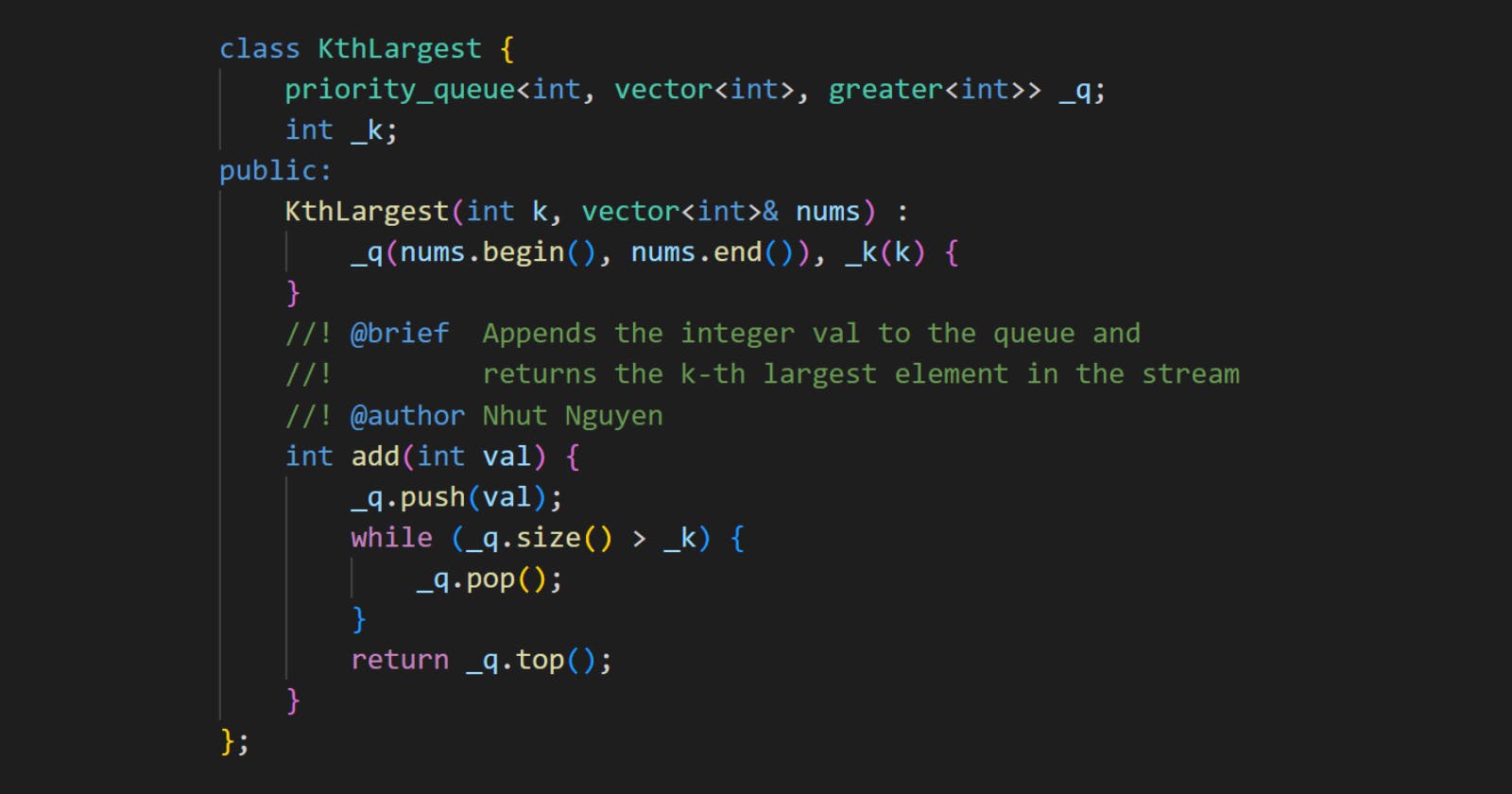Problem statement
Design a class to find the k-th largest element in a stream. Note that it is the k-th largest element in the sorted order, not the k-th distinct element.
Implement KthLargest class:
KthLargest(int k, int[] nums)Initializes the object with the integerkand the stream of integersnums.int add(int val)Appends the integervalto the stream and returns the element representing thek-thlargest element in the stream.
Example 1
Input
["KthLargest", "add", "add", "add", "add", "add"]
[[3, [4, 5, 8, 2]], [3], [5], [10], [9], [4]]
Output
[null, 4, 5, 5, 8, 8]
Explanation
KthLargest kthLargest = new KthLargest(3, [4, 5, 8, 2]);
kthLargest.add(3); // return 4
kthLargest.add(5); // return 5
kthLargest.add(10); // return 5
kthLargest.add(9); // return 8
kthLargest.add(4); // return 8
Constraints
1 <= k <= 10^4.0 <= nums.length <= 10^4.-10^4 <= nums[i] <= 10^4.-10^4 <= val <= 10^4.At most
10^4calls will be made to add.It is guaranteed that there will be at least
kelements in the array when you search for thek-thelement.
Solution 1: Sort and Append
Sort the stream when initialization. And keep it sorted whenever you append a new value.
Example 1
For nums = [4, 5, 8, 2] and k = 3.
Sort
nums = [8, 5, 4, 2].Adding
3tonums. It becomes[8, 5, 4, 3, 2]. The third largest element is4.Adding
5tonums. It becomes[8, 5, 5, 4, 3, 2]. The third largest element is5.Adding
10tonums. It becomes[10, 8, 5, 5, 4, 3, 2]. The third largest element is5.So on and so on.
Code
#include <vector>
#include <algorithm>
#include <iostream>
using namespace std;
class KthLargest {
vector<int> _nums;
int _k;
public:
KthLargest(int k, vector<int>& nums) : _nums(nums), _k(k) {
sort(_nums.begin(), _nums.end(), std::greater());
}
int add(int val) {
auto it = _nums.begin();
while (it != _nums.end() && val < *it) {
it++;
}
_nums.insert(it, val);
return *(_nums.begin() + _k - 1);
}
};
int main() {
vector<int> nums{4,5,8,2};
KthLargest a(3, nums);
cout << a.add(3) << endl;
cout << a.add(5) << endl;
cout << a.add(10) << endl;
cout << a.add(9) << endl;
cout << a.add(4) << endl;
}
Output:
4
5
5
8
8
Complexity
Runtime:
O(NlogN), whereN = nums.length.Extra space:
O(1).
Solution 2: Priority queue
There is a data structure that has the property you want in this problem.
It is std::priority_queue, which keeps its top element is always the largest one according to the comparison you define for the queue.
By default, the "less than" comparison is used for std::priority_queue and the top one is always the biggest element.
If you want the top one is always the smallest element, you can use the comparison "greater than" for your queue.
Code
#include <vector>
#include <queue>
#include <iostream>
using namespace std;
class KthLargest {
priority_queue<int, vector<int>, greater<int>> _q;
int _k;
public:
KthLargest(int k, vector<int>& nums) :
_q(nums.begin(), nums.end()), _k(k) {
}
int add(int val) {
_q.push(val);
while (_q.size() > _k) {
_q.pop();
}
return _q.top();
}
};
int main() {
vector<int> nums{4,5,8,2};
KthLargest a(3, nums);
cout << a.add(3) << endl;
cout << a.add(5) << endl;
cout << a.add(10) << endl;
cout << a.add(9) << endl;
cout << a.add(4) << endl;
}
Output:
4
5
5
8
8
Complexity
Runtime:
O(N), whereN = nums.length.Extra space:
O(1).
References
Thanks for reading. Feel free to share your thought about my content and check out my FREE book “10 Classic Coding Challenges”.

